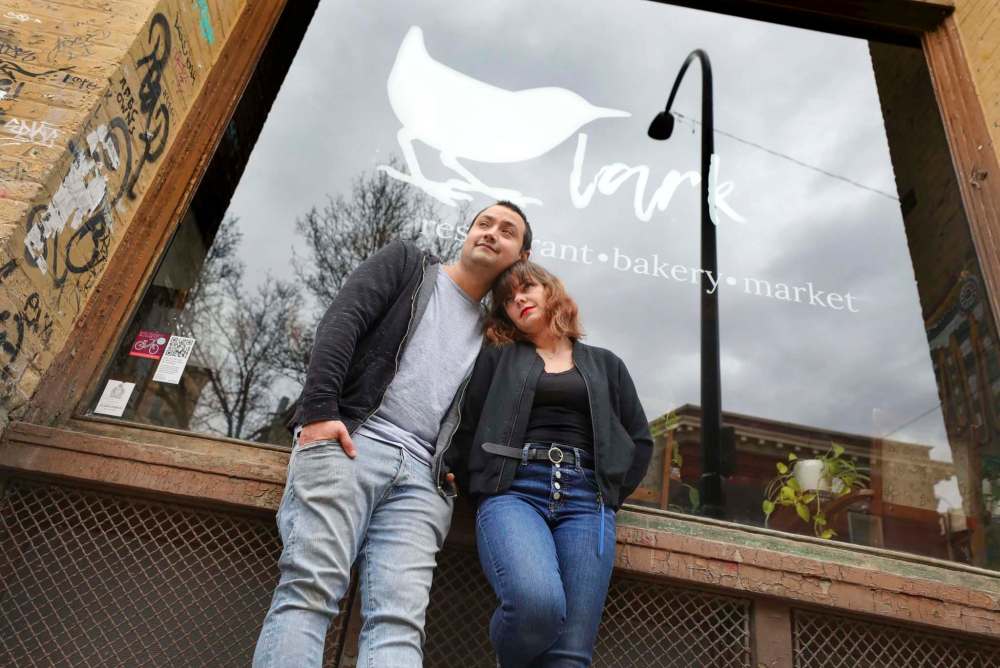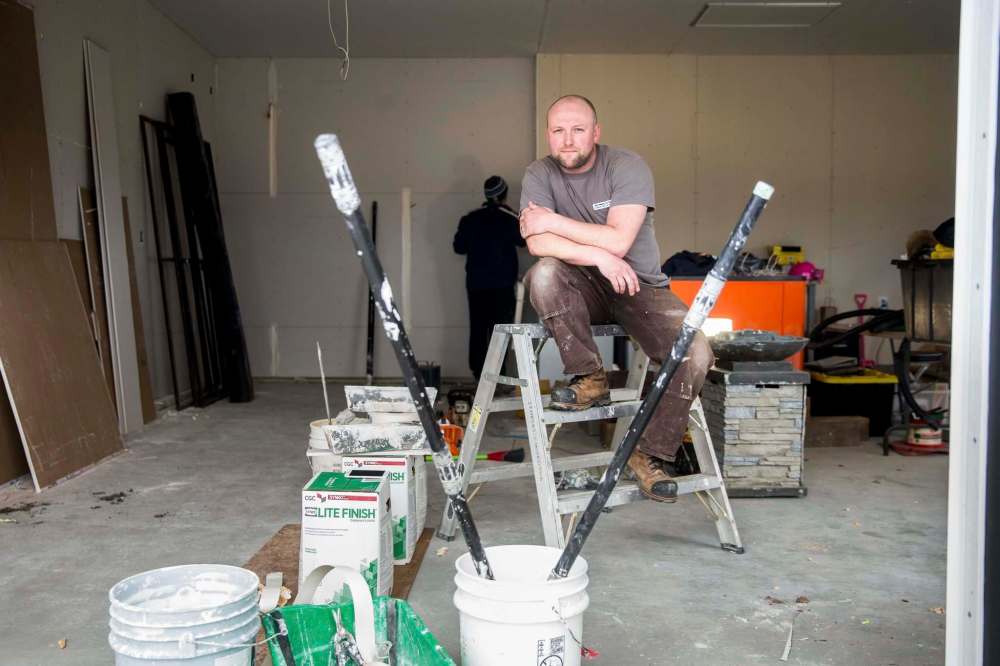Reopening doors to uncertain future Manitoba small businesses in limbo as support programs fall short, consumers deal with economic fallout
Read this article for free:
or
Already have an account? Log in here »
To continue reading, please subscribe:
Monthly Digital Subscription
$0 for the first 4 weeks*
- Enjoy unlimited reading on winnipegfreepress.com
- Read the E-Edition, our digital replica newspaper
- Access News Break, our award-winning app
- Play interactive puzzles
*No charge for 4 weeks then price increases to the regular rate of $19.00 plus GST every four weeks. Offer available to new and qualified returning subscribers only. Cancel any time.
Monthly Digital Subscription
$4.75/week*
- Enjoy unlimited reading on winnipegfreepress.com
- Read the E-Edition, our digital replica newspaper
- Access News Break, our award-winning app
- Play interactive puzzles
*Billed as $19 plus GST every four weeks. Cancel any time.
To continue reading, please subscribe:
Add Free Press access to your Brandon Sun subscription for only an additional
$1 for the first 4 weeks*
*Your next subscription payment will increase by $1.00 and you will be charged $16.99 plus GST for four weeks. After four weeks, your payment will increase to $23.99 plus GST every four weeks.
Read unlimited articles for free today:
or
Already have an account? Log in here »
Hey there, time traveller!
This article was published 29/04/2020 (2054 days ago), so information in it may no longer be current.
Shortly after closing his barbershop in mid-March, Jeremy Regan (owner/operator of Hunter & Gunn on Broadway) sat down with his wife, Jane, to discuss the trouble headed their way.
Social-distancing restrictions had forced businesses to shutter, and, like most small operations, when the doors are closed, the future gets pretty dim, pretty quickly. There was rent, insurance and utilities to cover, and not a single dollar coming in.
There were government support programs, but Hunter & Gunn made for an awkward fit.

Wage subsidies were not really useful because the business was not permitted to continue operating, even in limited fashion. Some of the shop’s employees qualified for enhanced employment benefits, and Regan was able to get a $40,000 federal line of credit — but he won’t spend any of it until he knows when his Winnipeg barbershop can reopen.
The writing was on the wall, and Regan wanted to make sure he and his family read it all.
“We just took a look around at what was happening and decided that if the shutdown continued for a long time, we were going to go bankrupt and we’d have to sell our home,” said the 46-year-old.
“We, obviously, didn’t want that to happen, but we thought we should be prepared. And mostly, we were okay with it. We’re not people who worry that much about stuff, but we had to face the reality.”
So far, none of those drastic actions have been required. Now that he will be allowed to reopen May 4, as per the recent guidelines provided by the province, a lot of the uncertainty has been alleviated.
“We now for sure know that there was nothing available to help small businesses through things like this. Not really. They don’t really understand us.”– Hunter & Gunn owner Jeremy Regan
Although, Regan said, he is still concerned this crisis has confirmed how little government knows about small business.
“We now for sure know that there was nothing available to help small businesses through things like this,” he said. “Not really. They don’t really understand us.”
The lockdown necessitated by the rapid spread of the novel coronavirus hit almost all sectors of the economy hard, but none more so than small businesses. With limited employees and small profit margins, most run close to break-even, and that’s with a fully-functioning economy.
Government has tried to respond: Ottawa unleashed a broad range of supports for both individuals and businesses; there are employment insurance benefits, wage subsidies and various forms of loans or lines of credit.
However, the programs being delivered are, in many instances, not meeting stated goals.
“Many people, not just politicians, underestimate the degree to which the finances of small firms are geared… day-to-day,” said Ted Mallett, chief economist for the Canadian Federation of Independent Business. “Most don’t have large financial stockpiles or rainy day funds to rely upon.”
Small business split on federal wage subsidy

Posted:
TORONTO - When the impact of COVID-19 led Hongwei Liu to temporarily lay off some employees and slash company forecasts, the founder of Waterloo, Ont.-based technology startup MappedIn hoped he might qualify for a helping hand under the federal government's emergency wage subsidy.
In early April, a CFIB survey found only one-third of Manitoba small businesses were able to continue operating during the pandemic; another 30 per cent are “worried about permanent closure.”
The survey matches up against national data from Statistics Canada, which shows one-third of all businesses reported revenue losses of 40 per cent or more from the same period a year earlier.
There have been several problems with the federal and provincial supports, Mallett noted.
Programs such as a wage subsidy or rent assistance are only available after-the-fact; businesses must find the money to pay wages and rent upfront and will only receive the subsidy funds months later. That is simply unrealistic for many small firms who are cash-poor within days of shutting operations, he said.
Ottawa’s hard eligibility requirements are also leaving many businesses in limbo. “For example, you need a 30 per cent drop in revenues to qualify for the wage subsidy,” Mallett said. “Well, if you’ve got a 29 per cent loss, you’re out of luck. We really hope there will be some movement in those barriers over time.”
Another criticism has been too many support programs focus on providing loans.
“It’s impossible for us to take advantage of the loan when we didn’t have any idea about when we can reopen,” said Kristen Cheremika, 35, who, along with husband Kyle Lew, owns Lark restaurant in Winnipeg’s Exchange District.
“Even interest-free, I don’t want to build up a bunch of loans if I don’t know when I can start paying them back. The loan, for us, would be just another albatross around our necks.”

The pandemic lockdown could not have come at a worse time for Cheremika and Lew. After several years building up positive reviews and a loyal clientele at Chew restaurant on Corydon Avenue, the couple decided late last year to pursue a new concept and location at 91 Albert St.
The first few months in their new location were successful, Cheremika said, but the business still needed time to grow and become established. When the pandemic forced restaurants to close, there was some thought to providing take-out or delivery service (as many others have done). However, online delivery services charge high commissions and there didn’t seem to be a scenario where Lark could break-even.
“Our staff was, to be honest, comfortable when we closed,” she said. “They were scared and concerned about the virus. And even if you’re doing takeout, you need a certain number of staff to make it work. Many of them got employment benefits and they’ll be okay for a while.
“We’re just not sure about how we’re going to make out.”
Now that there is a reasonably firm June 1 timetable for the limited resumption of sit-down dining, Cheremika said wage and rent subsidies may prove to be beneficial — but only if her customers show an appetite for going out and eating in a restaurant with other customers.
Cheremika said she is astounded by how useless some of the support programs have been. When the Manitoba government announced a rebate on workers compensation benefits, Cheremika said she could only chuckle.
“We don’t pay high premiums because we don’t have a lot of workplace accidents. So, the rebate works out to be about $200 for us. That’s not a huge help.”
For small businesses that have been able to continue operating in a limited fashion, the future remains just as uncertain.

Stephen Jenkyns, owner of Jenkyns Construction Ltd. in Winnipeg, has been able to maintain a baseline of work throughout the lockdown, but even that may come to an end soon.
“We’re still doing some jobs, but they’re all things that I was working on before all this happened,” said Jenkyns, 31, who has owned and operated his contracting business since 2009. “But it’s not business as usual. We were lucky because we were deemed essential.
“A lot of people think: that’s great, you can continue working. But if people don’t want to let you into their home, it doesn’t matter.”
Many projects have been delayed or cancelled, Jenkyns said, as clients deal with economic uncertainty. Sometimes, the concern is just having workers in close contact with family; other times, delays or cancellations are a function of lost jobs and wages.
“A lot of people think: that’s great, you can continue working. But if people don’t want to let you into their home, it doesn’t matter.”– Stephen Jenkyns, owner of Jenkyns Construction
“I had one client who lost his job and just couldn’t afford to do the work,” Jenkyns said. “He had all this money saved for a project, but now he needs to live on it until he can find another job. Another client works in an industry where her pay was all on commission and she didn’t know if the business was going to come back after this ends.”
The impact of the slowdown in work has been felt most by a handful of employees Jenkyns was forced to layoff. To help keep as many people employed for as long as possible, Jenkyns said he got the $40,000 emergency loan from the federal government. Even with a reduced workforce, that money will run out soon and it’s unclear when, or if, people will start renovating their homes again.
“I’d like to think that I’ve been a lot luckier than most small businesses,” he said. “I’m trying to keep as many of my guys working because I honestly believe in karma, and even if it’s not the best business decision, I have to try and keep those guys working.
“When this blows over, I think I’m going to have employees who are thankful and there will be a lot of loyalty. We’re going to feel like we all got through COVID-19 together and survived. That’s what I hope, anyway.”
dan.lett@freepress.mb.ca

Born and raised in and around Toronto, Dan Lett came to Winnipeg in 1986, less than a year out of journalism school with a lifelong dream to be a newspaper reporter.
Our newsroom depends on a growing audience of readers to power our journalism. If you are not a paid reader, please consider becoming a subscriber.
Our newsroom depends on its audience of readers to power our journalism. Thank you for your support.







